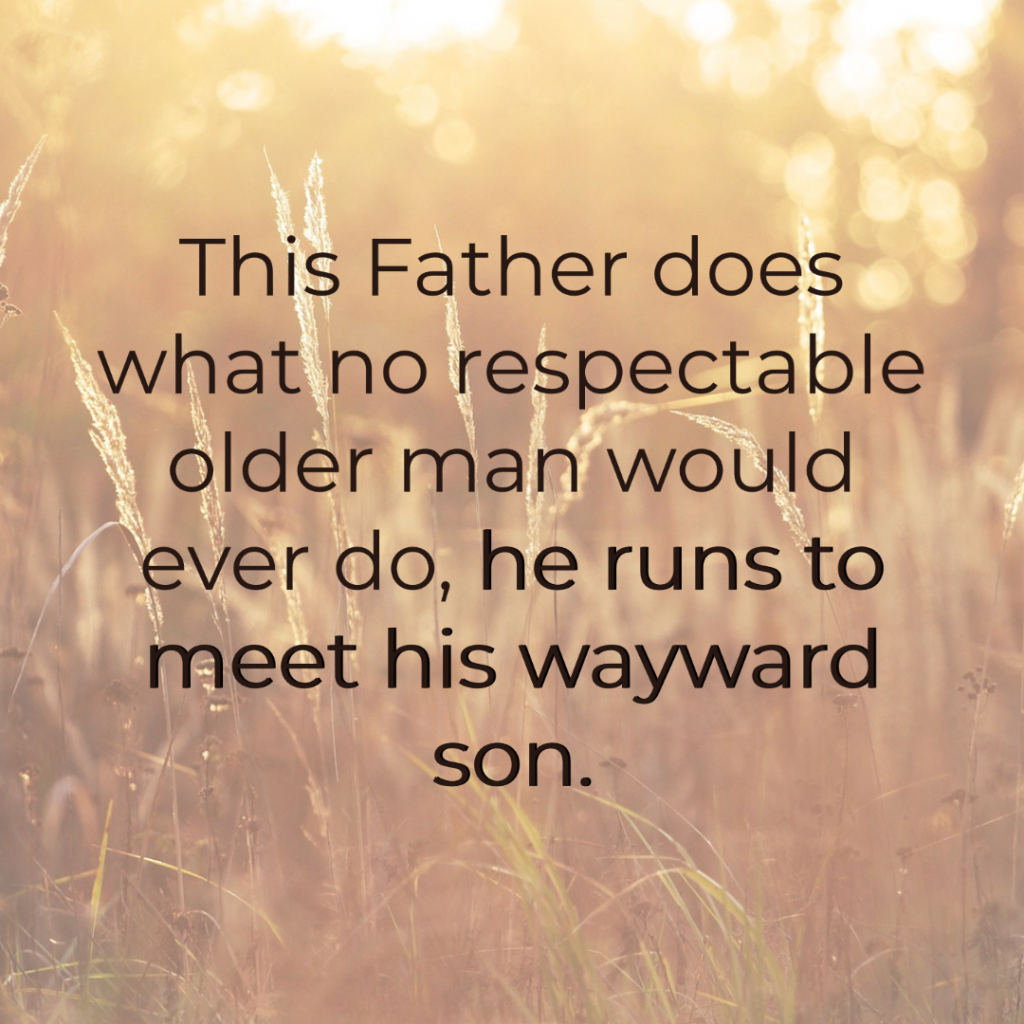Sheep and coins are one thing, but what about a son when he has not only gone missing but brought shame on the family? This week we finish blog post from January 14—Come, Let Us Celebrate – Part I.
The Loving Father, the Family, and the Sons.
Luke 15: 11-32 11 And he said, A certain man had two sons: 12 And the younger of them said to his father, Father, give me the portion of goods that falleth to me. And he divided unto them his living. 13 And not many days after the younger son gathered all together, and took his journey into a far country, and there wasted his substance with riotous living. 14 And when he had spent all, there arose a mighty famine in that land; and he began to be in want. 15 And he went and joined himself to a citizen of that country; and he sent him into his fields to feed swine. 16 And he would fain have filled his belly with the husks that the swine did eat: and no man gave unto him. 17 And when he came to himself, he said, How many hired servants of my father’s have bread enough and to spare, and I perish with hunger! 18 I will arise and go to my father, and will say unto him, Father, I have sinned against heaven, and before thee, 19 And am no more worthy to be called thy son: make me as one of thy hired servants. 20 And he arose, and came to his father. But when he was yet a great way off, his father saw him, and had compassion, and ran, and fell on his neck, and kissed him. 21 And the son said unto him, Father, I have sinned against heaven, and in thy sight, and am no more worthy to be called thy son. 22 But the father said to his servants, Bring forth the best robe, and put it on him; and put a ring on his hand, and shoes on his feet: 23 And bring hither the fatted calf, and kill it; and let us eat, and be merry: 24 For this my son was dead, and is alive again; he was lost, and is found. And they began to be merry. 25 Now his elder son was in the field: and as he came and drew nigh to the house, he heard musick and dancing. 26 And he called one of the servants, and asked what these things meant. 27 And he said unto him, Thy brother is come; and thy father hath killed the fatted calf, because he hath received him safe and sound. 28 And he was angry, and would not go in: therefore came his father out, and intreated him. 29 And he answering said to his father, Lo, these many years do I serve thee, neither transgressed I at any time thy commandment: and yet thou never gavest me a kid, that I might make merry with my friends: 30 But as soon as this thy son was come, which hath devoured thy living with harlots, thou hast killed for him the fatted calf. 31 And he said unto him, Son, thou art ever with me, and all that I have is thine. 32 It was meet that we should make merry, and be glad: for this thy brother was dead, and is alive again; and was lost, and is found.
I don’t fully understand the way a “shame/honor” culture works because I live in a western, guilt-motivated mindset. When a western mind reads this story, we tend to think that the young man returned because he was guilty and the father forgives his sin against him. While that is true, the impact of the son’s choices go a lot deeper. He brought SHAME on the entire family and since the extended family probably lived in the same village, the shame extended to the village. The last thing you would want to do is return to that family. In a culture which functions in this way, shame is used to keep people in line, versus guilt in our culture. From my understanding there was no good way for a son like this to be restored to the family.
Jesus says that the son travels to a “far” country. This could have been far in distance, or far in ideology, probably both. In Jesus’ time one did not have to travel far physically to leave the Jewish traditions and culture. The Greco-Roman world or Decapolis on the other side of the Sea of Galilee with its temptations and allurements were not far away. Perhaps he traveled to Rome or Egypt or maybe Tarshish (like Jonah) to get as far away from the life he knew, to see the world.
According to the Law of Moses, the young man was supposed to wear a blue and white tassel on the corners of his clothing to remind him of God. He probably removed them as he wandered wide-eyed into the far country. He no longer wanted anything to do with the background that held him, that anchor had now become a ball and chain. I am sure he saw many expensive things that he could buy, clothes he would have never been allowed to wear as a Jewish boy, places he could now go, things he could do, because nobody could tell him “NO.”
Times got tough, in part due to conditions outside of his control, so he picked up the only job he could find, doing one of the most despicable jobs a Jewish person could imagine… feeding pigs.
In the depths of despair, he has an “aha” moment, “I could go home and apologize to my Father.” Jesus uses wording that sounds very similar to another character… Pharaoh. It is suggested that Jesus listeners would have made the connection to Exodus 10:16 where Pharaoh tells Moses, “I have sinned against the Lord your God and against you.” So maybe this young man isn’t truly repentant but just wants out of his predicament. Maybe he only wants out of the pig pen that he got himself in. Is he truly repentant?
On the Way Home…
Here comes the son making his way home, with shaky motives at best. He knows he will be ridiculed and ostracized by his village but perhaps he can get three square meals a day. Did you “come home” to the Father with less than noble reasons? Apologize to smooth things over? Repent because you got caught? Ouch!
This Father does what no respectable older man would ever do, he runs to meet his wayward son. He picked up the long robe and scrambled down the road to catch his son. Before his son changed his mind. Before the villagers saw him. Before his elder brother caught him. No respectable gentleman would shame HIMSELF to run. Wasn’t there enough shame on the family already? He fully disgraces himself because of his compassion.

The Reception.
The robe, the ring, the shoes, and especially the meal all symbolize restoration. There is a middle eastern custom of using a meal to make peace between two opposing parties. There is a story told of a young Israeli who was driving through a Palestinian village late one night and struck and killed a mentally handicapped Palestinian boy. The Israeli was so distressed by this that he insisted on returning to the village and asking for forgiveness. Everyone told him, “no way, they will kill you.” He replied that he would rather die than to continue to live like this. When he arrived in the village it was understandably tense, but the father of the child decided that he would extend forgiveness. To symbolize it they had a third party or mediator prepare a meal and they ate together. The Palestinian father then declared that the Israeli young man would take the place of the dead son as a SON. He would be part of the family. Eating together also meant that no one ever dared speak of this again.
The Father declares a feast, this wasn’t just a big meal, this symbolized a full return into the family! Does that bring to mind some other feasts mentioned in the Bible?
The Elder Brother.
Jesus is no doubt pointing back to the original question about eating with publicans and sinners. The Father did not love this son any less. Can you hear the Father’s love in Luke 15:31 and 32? “‘My son,’ the father said, ‘you are always with me, and everything I have is yours. But we had to celebrate and be glad, because this brother of yours was dead and is alive again; he was lost and is found.’”
Conclusion.
“This man receives sinners and eats with them.” (Luke 15:2) This was the original issue.
Jesus weaves a masterful story about the Father’s love in searching for what was lost and the Father’s mercy in receiving back the miserable wretches that repent.
To be honest, I am a mixture of the two sons. I, too, was wayward; and I, too, am prejudiced toward those who have gone into a far country and wasted their substance in riotous living. They don’t fully deserve to be totally free of the shame and guilt… but then again, neither do I.
I want to call you (and me) to the following:
- Rejoice and praise God for His incredible love.
- Join in looking for the lost; you were lost at one time too.
- Join in the rejoicing of Heaven when they are found!
To listen to this full sermon preached at Bradford Mennonite Church, click here.
-Tony High

